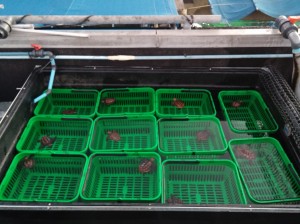 Whichever < way you look at it, ours is an increasingly plasticized world. With 290 million tonnes of plastic produced annually on a global basis, and plastic products being used in almost every aspect of human life from food packaging to reusable shopping bags; cellphones; ceiling insulation and geyser blankets; fibres for geo-textiles; the lining of train tunnels; and in the construction of roads and power stations, plastic is the most ubiquitous material on the planet. Happily, plastic is also recyclable, with recycling showing a year on year increase in the total tonnage being converted.
Here are some interesting recycling facts:
11 recycled cool drink bottles = 1 pair of trousers
35 recycled water bottles = 1 polar fleece jacket
41 recycled polystyrene hamburger clamshells = 1 plastic picture frame
4000 recycled 2 liter milk bottles = 1 park bench
Recycling 1 plastic bottle can save enough energy to power a 60W light bulb for 6 hours, or run a television set for 3 hours
Recycling 1 tonne of PET bottles can save 1.5 tonnes of carbon emissions.
Whichever < way you look at it, ours is an increasingly plasticized world. With 290 million tonnes of plastic produced annually on a global basis, and plastic products being used in almost every aspect of human life from food packaging to reusable shopping bags; cellphones; ceiling insulation and geyser blankets; fibres for geo-textiles; the lining of train tunnels; and in the construction of roads and power stations, plastic is the most ubiquitous material on the planet. Happily, plastic is also recyclable, with recycling showing a year on year increase in the total tonnage being converted.
Here are some interesting recycling facts:
11 recycled cool drink bottles = 1 pair of trousers
35 recycled water bottles = 1 polar fleece jacket
41 recycled polystyrene hamburger clamshells = 1 plastic picture frame
4000 recycled 2 liter milk bottles = 1 park bench
Recycling 1 plastic bottle can save enough energy to power a 60W light bulb for 6 hours, or run a television set for 3 hours
Recycling 1 tonne of PET bottles can save 1.5 tonnes of carbon emissions.
 Recycling not only keeps our environment clean, it also turns waste into something useful, reduces pollution in the ocean and on land, and extends the life of our landfill sites. Recycled materials that go back into production streams save huge amounts of energy and raw materials. In terms of reuse, plastic bags can be reused as bin liners, plastic food containers as seed trays, plastic ice-cream containers as freezer and/or storage containers and soft drink bottles as portable water bottles for the car or at the beach.
Recycling not only keeps our environment clean, it also turns waste into something useful, reduces pollution in the ocean and on land, and extends the life of our landfill sites. Recycled materials that go back into production streams save huge amounts of energy and raw materials. In terms of reuse, plastic bags can be reused as bin liners, plastic food containers as seed trays, plastic ice-cream containers as freezer and/or storage containers and soft drink bottles as portable water bottles for the car or at the beach.
 Plastic products can also be used in other wonderfully innovative ways to directly benefit the planet, such as the cattle water trough and shopping baskets, which are being used by the Two Oceans Aquarium in Cape Town, to temporarily house baby turtles that are being rehabilitated prior to eventual release.
Plastic products can also be used in other wonderfully innovative ways to directly benefit the planet, such as the cattle water trough and shopping baskets, which are being used by the Two Oceans Aquarium in Cape Town, to temporarily house baby turtles that are being rehabilitated prior to eventual release.
If we view plastic as a valuable recyclable material, don’t litter, and are responsible about recycling, perhaps we can limit the plasticizing of our world. Is this an unrealistic pipe-dream? I really hope not.
Works about the positive use of plastics is as scarce as hen’s teeth and is usually the labour of the plastics, engineering or packaging industry and is seen as dubious by so many as just a “green washing” or public relations stunt. I read on a daily basis, blogs, letters, and articles from a very large community of environmentalists that seem to have lost focus of the bigger picture. No one disputes the fact that plastic in the environment and in particularly the sea is damaging but to believe that it is the biggest environmental threat facing the marine environment is myopic. (I read this yesterday on Facebook from an activist). Overfishing, acidification and global warming is something I have lived with as a conservationist for the last 30 years. I used to be able to walk on ice flows that is not there anymore, have dived in areas where the coral reefs used to be abundant and witnessed the slaughter of large amounts of fish stocks. I have also saved many animals from entanglements of plastic and non- plastic material, so yes, plastics do kill! The research into the impact of micro plastics is still in its beginning but some have already judged it to be a monster of gargantuan proportions. Plastics is providing a platform to ensure that a growing population is fed and many of our 21st Century technologies would not be possible. Demonising plastics is occasionally clouded in a “moral high ground cloud” of struggling to address the issue of overconsumption. If I lived in First World Country I would conceivably also attack a material as a symbol of this illness. Look at the magic and joy of the Solar Pulse at the moment – plastics is also making that possible. Viva the evolution that we are all part of now – plastics is also assisting with us going forward. The sad part of all of this is that as I work in the plastics industry, many will say that he is just echoing the voice of his master. If you knew me and my past, you would have another view. Environmentalism is not the monopoly of the few that disparages everything without giving ideas for solutions. What I would also love to see is that my colleagues in the written environmental field address the issue of littering and poor waste management with the same vigour. But then it is properly not so easy.
Thanks John – point well made!! Warm wishes, Carole
Thank You for a well thought out response John. As always I honestly welcome your intelligent and experienced points of view and, as you so rightly alluded to your past , always know that you hold a broad and informed perspective of all marine litter related issues. As always I have learnt from you… Hayley